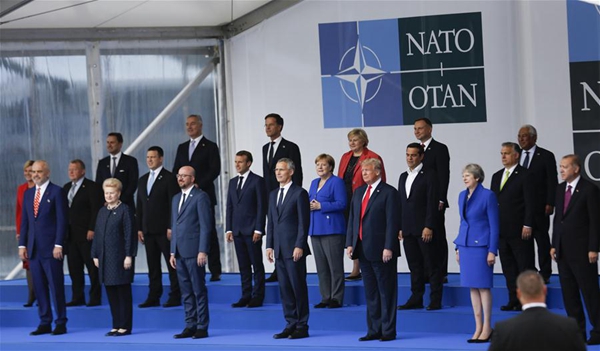NATO summit and international security
- By Aftab Hussain
 0 Comment(s)
0 Comment(s) Print
Print E-mail China.org.cn, July 13, 2018
E-mail China.org.cn, July 13, 2018
The North Atlantic Treaty Organization (NATO) summit has ended in Brussels and President Trump made several interesting remarks and also threatened to pull American support out of the alliance.

He was quoted as saying "they [member states] must raise spending by January 2019 or the United States would go it alone." Fascinatingly, one cannot help but think, can the U.S. actually pull out of NATO since after the end of the Cold War all that NATO has been doing is serving American interests?
He tweeted "On top of it all, Germany just started paying Russia, the country they want protection from, Billions of Dollars for their Energy needs coming out of a new pipeline from Russia. Not acceptable! All NATO Nations must meet their 2% commitment, and that must ultimately go to 4%."
Angela Merkel's response to Trump and refusal of NATO allies to commit 4 percent of their annual output (GDP) to military spending spiced things up a little bit, before Trump left for England. In a way the summit was hijacked by comments from President Trump. It sounded like America does not trust other member states and they need to do more. Other member nations were clarifying their positions in response to Trump's opinion.
The reason for the birth of NATO itself was the Cold War which ended a long time ago. Many scholars around the world agree that there is no need for such an alliance. Previously there was the Soviet Union and Warsaw Pact, none of them exist now. What is the reason for NATO? Besides serving American national interests and fighting American battles what use is this alliance for Europe? There are many troubles which would not exist if there was no NATO.
It is time for the European nations to calculate whatever they have contributed since 1949 and how much has been actually spent for their defense to neutralize the threats from the former Soviet Union and present-day Russia.
In the final declaration of the summit it is stated that "We [member states] have also suspended all practical civilian and military cooperation between NATO and Russia, while remaining open to political dialogue." It is interesting to note that many European countries depend on Russian energy and still see Moscow as a threat.
Russia is looking for closer cooperation with its European and Asian neighbors for energy and economic deals. Any conflict with them will amount to losing a market and an opportunity for national and social development of their own nation. President Trump's views on oil and gas deals between Russia and Germany sounded like he is still seeing things through the Cold War prism and Russia equals the Soviet Union to him. On a previous occasion President Trump has also called Russia and China rival states to the United States.
Apart from the dispute over increasing military spending for NATO, the only important issue discussed at the summit was the issue of Afghanistan. Presently 13,195 troops are committed in Afghanistan under the Resolute Support Mission (RSM) which was launched in January 2015.
RSM initiated following the completion of the mission of the International Security Assistance Force (ISAF) in December 2014, when responsibility for security in Afghanistan was transferred to the Afghan national defense and security forces. Under RSM these troops are leading a non-combat mission to train, advice and assist the Afghan security forces and institutions. The important question remains despite such huge military spending, time and effort, how much have the Afghan security forces gained?
A large territory of Afghanistan is still under the control of Taliban. The rate of desertion among Afghan security forces does not seem to have reduced, if not increased, and their inability is pointing to the fact that security situation is still not under the control of the Afghan government. One cannot out rightly reject the contribution of NATO in improving the security situation in Afghanistan but the loses of this war outweigh the gains.
The path to peace in Afghanistan is a long road to travel and the complexity of the problem and multiple factors and actors involved further complicate the situation. When NATO entered in Afghanistan after 9/11, it did not have any plan for post-war Afghanistan and even today they do not have any workable solution.
The American monopoly over NATO and the involvement of member countries in the U.S.-led conflicts requires alliance members to make an analysis for the continuation of such an alliance in times when the Cold War is over. Member states interdependence on Russia and changing geo-economics situation entails change in the foreign and defense policies of European nations instead of sacrificing for the U.S.
Apart from the U.S., other member states may be serious for peace in Afghanistan but the problem remains that none of their plans is acceptable to the U.S. Therefore, their commitment in Afghanistan is of what use for them? Only an Afghan-led Afghan-owned process can bring peace in Afghanistan, people have already rejected many NATO-led and NATO-owned processes.
Aftab Hussain is a PhD scholar at East China Normal University, Shanghai.
Opinion articles reflect the views of their authors, not necessarily those of China.org.cn.






Go to Forum >>0 Comment(s)